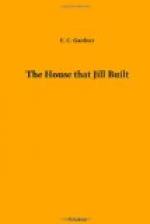“How perfectly exasperating,” said Bessie in a tragic aside to Jim. “No one ought to try to give reasons in art, in religion or in politics. Intuitions are so much more satisfactory. Don’t you always rely on your intuitions, Mr. James?”
“Perhaps I should if I had them, but somehow I—I never seem to have any.”
“The meeting appears to be divided,” said Jack. “Bessie says seven, Jim says fourteen. Suppose we split the difference and call it ten and a half.”
“That is, we advise the architect to do as he pleases, then he will be sure to follow our advice.”
CHAPTER XI.
WHAT SHALL WE STAND UPON?
“Splitting the difference” is a convenient compromise, but it is not always creditable to both parties, and Jill thought it would not be safe with such advisers to assume that Wisdom’s house is always built between two extremes. She felt, too, that the architect’s discussion of details must be tiresome to her guests, and therefore resolved to take up but one more of his queries, spending the remainder of the evening in looking over plans and letters, of which she had an ample store still unexplored, or in listening to Bessie’s ardent description of the treasures she hoped to find in the lofty recesses of the old garrets.
“I fear the next topic will not be deeply interesting, but it is the last one to-night, and Jack must give me his undivided attention if he wishes to know what we are to stand upon in the new house.”
“Is it about floors?” Bessie asked. “Do please have waxed floors. I dote on waxed floors, don’t you, Mr. James?”
“Not especially; but I’m pretty apt to slip on them. Is it about floors, Jill?”
“Yes, but chiefly about the best way to build them—their construction.”
[Illustration: A PROMISE OF SOCIAL SUCCESS.]
“I thought the architect was to settle questions of construction to suit himself.”
“He is, and this topic he writes ’concerns construction, cost, use and design, and is, therefore, one on which we may properly take counsel together.’”
“How condescending!”




